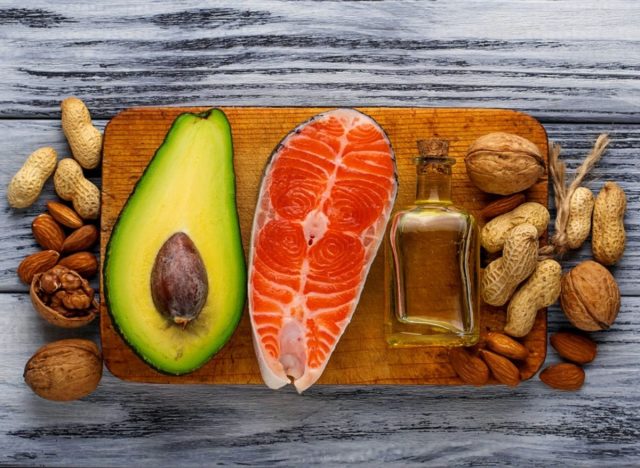For some individuals, it can be just as challenging to gain weight in a healthy and sustainable way as it is for people who are trying to lose it. There are various reasons why you may be looking to gain weight, like if you want to pack on muscle mass when strength training, or perhaps you’re underweight. This guide will outline exactly how to gain weight if you’re underweight.
We’re providing you with practical, nutritious strategies to help you achieve your weight-gain goals while ensuring your body gets the essential nutrients it needs. By focusing on well-balanced meals, calorie-dense foods, and more frequent meals, you can gain weight the healthy way.
Here’s how you can gain weight through the foods you consume:

It’s important to maintain the best diet for you and map out your meals. Habits like incorporating healthy fats, boosting your overall calorie intake, and drinking your calories can make a major difference in your efforts.
1. Boost your calories.
If you want to gain weight, it’s all about eating more than your body burns. Think of it like giving your body extra fuel!
Start by figuring out how much energy you need daily, then add 300 to 500 extra calories on top. Choose yummy, calorie-packed foods like nuts, cheese, avocados, and whole grains. Just make sure you’re picking goodies that also give you nutrients, not just empty calories from junk food.
2. Add healthy fats to your meals.
Healthy fats are your new best friend! They’re super calorie-dense, which means you can eat less but gain more. Sounds like a win-win, right?
Add delicious fats like olive oil, avocados, nuts, seeds, and fatty fish to your meals. Drizzle olive oil on your salads, add some avocado on your toast, and munch on nuts and seeds as snacks. You can even cook with avocado oil or blend some nut butter into your smoothies for an extra creamy, calorie-packed treat.
3. Choose liquid calories.
Drinking your calories is a super easy way to up your intake without feeling stuffed. Some options are creamy smoothies, rich milkshakes, and tasty protein shakes.
Blend up some fruit, veggies, protein powder, yogurt, and milk (or a milk alternative) for a tasty drink. Add nut butters, oats, or seeds for an extra calorie punch. This is a great way to sneak in more calories, especially if you’re not a big eater.
4. Sprinkle on some extras.
Sometimes, it’s the little things that make a big difference! Sprinkle calorie-rich extras on your meals to effortlessly boost your intake. Think cheese, nuts, seeds, and healthy oils. Top your veggies, salads, and pasta with grated cheese, toss nuts or seeds into your cereal or yogurt, and snack on dried fruits. Drizzle olive oil or add a pat of butter to your cooked dishes.
These tasty little additions can add up, making hitting your calorie goals easier (and more delicious).
General nutrition tips to gain weight healthily:

1. Focus on nutrient-dense foods.
Nutrient-dense foods are packed with essential vitamins, minerals, and other nutrients your body needs to function at its best. When trying to gain weight, it’s important to choose foods that provide calories and nourish your body. These foods give you the energy you need to fuel your body for weight gain. They provide a steady energy source, preventing energy crashes and keeping you feeling full and satisfied.
In addition, many nutrient-dense foods, especially those high in protein, support muscle growth and repair. This is crucial for healthy weight gain, as you want to gain muscle mass, not just fat.
2. Eat more frequently.
Eating more frequently is a safe and effective way to support weight gain.
Eating smaller, more frequent meals helps you consume more calories throughout the day without feeling overly full. This makes it easier to achieve a calorie surplus, which is necessary for weight gain.
As an added plus, eating more frequently can help maintain balanced blood sugar levels, which can help you stay energized throughout the day.
Safety tips to keep in mind:

1. Set realistic goals.
Achieving your goal weight is all about smart planning and healthy habits. Instead of aiming for drastic changes, go for small, steady progress like gaining a pound a week. This way, you’re more likely to reach your goals in a sustainable and healthy way.
2. Consult a healthcare professional.
A dietitian can create a personalized plan based on your health needs and goals. They’ll help you set achievable targets and monitor your progress, making adjustments as needed. Plus, they can clear up any myths about weight management and guide you toward the best food choices for your specific life circumstances.
3. Prioritize balanced nutrition.
Make sure your diet has the right mix of carbs for energy, proteins for muscle, and healthy fats. Don’t forget about vitamins and minerals from a variety of fruits, veggies, whole grains, lean meats, fish, nuts, and seeds. Stay hydrated by drinking plenty of water and eating hydrating foods like fruits and veggies.
With a balanced diet, your body will have all the nutrients it needs to support healthy weight gain.

